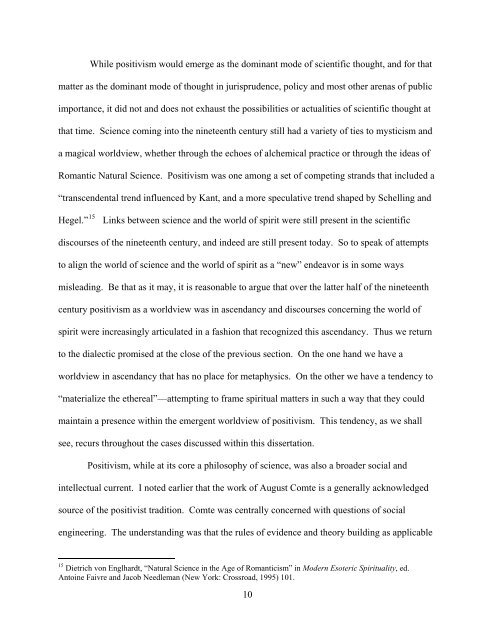A Genealogy of the Extraterrestrial in American Culture
A Genealogy of the Extraterrestrial in American Culture
A Genealogy of the Extraterrestrial in American Culture
You also want an ePaper? Increase the reach of your titles
YUMPU automatically turns print PDFs into web optimized ePapers that Google loves.
While positivism would emerge as <strong>the</strong> dom<strong>in</strong>ant mode <strong>of</strong> scientific thought, and for that<br />
matter as <strong>the</strong> dom<strong>in</strong>ant mode <strong>of</strong> thought <strong>in</strong> jurisprudence, policy and most o<strong>the</strong>r arenas <strong>of</strong> public<br />
importance, it did not and does not exhaust <strong>the</strong> possibilities or actualities <strong>of</strong> scientific thought at<br />
that time. Science com<strong>in</strong>g <strong>in</strong>to <strong>the</strong> n<strong>in</strong>eteenth century still had a variety <strong>of</strong> ties to mysticism and<br />
a magical worldview, whe<strong>the</strong>r through <strong>the</strong> echoes <strong>of</strong> alchemical practice or through <strong>the</strong> ideas <strong>of</strong><br />
Romantic Natural Science. Positivism was one among a set <strong>of</strong> compet<strong>in</strong>g strands that <strong>in</strong>cluded a<br />
“transcendental trend <strong>in</strong>fluenced by Kant, and a more speculative trend shaped by Schell<strong>in</strong>g and<br />
Hegel.” 15<br />
L<strong>in</strong>ks between science and <strong>the</strong> world <strong>of</strong> spirit were still present <strong>in</strong> <strong>the</strong> scientific<br />
discourses <strong>of</strong> <strong>the</strong> n<strong>in</strong>eteenth century, and <strong>in</strong>deed are still present today. So to speak <strong>of</strong> attempts<br />
to align <strong>the</strong> world <strong>of</strong> science and <strong>the</strong> world <strong>of</strong> spirit as a “new” endeavor is <strong>in</strong> some ways<br />
mislead<strong>in</strong>g. Be that as it may, it is reasonable to argue that over <strong>the</strong> latter half <strong>of</strong> <strong>the</strong> n<strong>in</strong>eteenth<br />
century positivism as a worldview was <strong>in</strong> ascendancy and discourses concern<strong>in</strong>g <strong>the</strong> world <strong>of</strong><br />
spirit were <strong>in</strong>creas<strong>in</strong>gly articulated <strong>in</strong> a fashion that recognized this ascendancy. Thus we return<br />
to <strong>the</strong> dialectic promised at <strong>the</strong> close <strong>of</strong> <strong>the</strong> previous section. On <strong>the</strong> one hand we have a<br />
worldview <strong>in</strong> ascendancy that has no place for metaphysics. On <strong>the</strong> o<strong>the</strong>r we have a tendency to<br />
“materialize <strong>the</strong> e<strong>the</strong>real”—attempt<strong>in</strong>g to frame spiritual matters <strong>in</strong> such a way that <strong>the</strong>y could<br />
ma<strong>in</strong>ta<strong>in</strong> a presence with<strong>in</strong> <strong>the</strong> emergent worldview <strong>of</strong> positivism. This tendency, as we shall<br />
see, recurs throughout <strong>the</strong> cases discussed with<strong>in</strong> this dissertation.<br />
Positivism, while at its core a philosophy <strong>of</strong> science, was also a broader social and<br />
<strong>in</strong>tellectual current. I noted earlier that <strong>the</strong> work <strong>of</strong> August Comte is a generally acknowledged<br />
source <strong>of</strong> <strong>the</strong> positivist tradition. Comte was centrally concerned with questions <strong>of</strong> social<br />
eng<strong>in</strong>eer<strong>in</strong>g. The understand<strong>in</strong>g was that <strong>the</strong> rules <strong>of</strong> evidence and <strong>the</strong>ory build<strong>in</strong>g as applicable<br />
15 Dietrich von Englhardt, “Natural Science <strong>in</strong> <strong>the</strong> Age <strong>of</strong> Romanticism” <strong>in</strong> Modern Esoteric Spirituality, ed.<br />
Anto<strong>in</strong>e Faivre and Jacob Needleman (New York: Crossroad, 1995) 101.<br />
10















